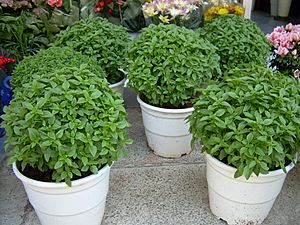Ocimum basilicum var. minimum facts for kids
Quick facts for kids Ocimum basilicum var. minimum |
|
|---|---|
 |
|
| Scientific classification |
|
| Kingdom: | Plantae |
| Clade: | Tracheophytes |
| Clade: | Angiosperms |
| Clade: | Eudicots |
| Clade: | Asterids |
| Order: | Lamiales |
| Family: | Lamiaceae |
| Genus: | Ocimum |
| Species: |
O. basilicum
|
| Varietas: |
O. b. var. minimum
|
| Trinomial name | |
| Ocimum basilicum var. minimum |
|
Greek basil (Ocimum basilicum var. minimum) is a small, bushy herb. It is a special type, or cultivar, of the popular plant called basil. This herb is known for its tiny, bright green leaves and strong, fresh smell.
Contents
What's in a Name?
The name "basil" has a royal history! It comes from old words like the Latin basilius. It also comes from the Greek word basilikón phutón. Both of these words mean "royal plant" or "kingly plant." So, basil is like the "king of herbs"!
Cooking with Basil
People around the world use basil in many tasty dishes. In China and Taiwan, fresh or dried basil is often added to soups. Imagine eating fried chicken with crispy, deep-fried basil leaves!
Basil is also used in surprising ways. Some chefs use it to make unique flavors in desserts. They might soak basil in cream to make special ice cream or chocolates. Even the small flower buds of the basil plant are edible. They have a milder flavor than the leaves.
Why Basil Smells So Good
Have you ever noticed that different types of basil smell a bit different? That's because basil plants have special natural oils. These are called essential oils. These oils are mixed in different amounts in each type of basil.
For example, the sweet smell of some basils comes from an oil called eugenol. These natural oils give basil its unique and wonderful scent!
Growing Basil
Growing basil is quite easy and fun! These plants grow for one year, so they are called "annual herbs." You can plant them in your garden in the spring. Make sure the danger of frost has passed.
Basil also grows very well in pots. You can bring these pots indoors for the winter. Place them near a sunny window. This way, you can keep harvesting fresh basil even when it's cold outside! In the spring, you can move the pots back outdoors. Or, you can simply plant new basil plants.
Basil in Culture
In Greece, many people do not eat basil. This is because of its connection to a religious event. This event is called the "Elevation of the Cross." There are no strict rules against eating it, but many Greeks have not developed a taste for it.
The story says that in 326 A.D., Empress Helene found the original cross that Jesus was crucified on. When she found it, basil was growing in the earth in the shape of a cross. She named the plant "Vasiliki," which means "of the king." She knew it was Jesus's cross because a sick woman kissed it and became well.
Basil in Old Medicine
In some old medicine practices, basil was thought to have healing powers. For example, in Ayurveda (an ancient Indian medicine system) and traditional Chinese medicine, basil was used for its special properties.
 | Dorothy Vaughan |
 | Charles Henry Turner |
 | Hildrus Poindexter |
 | Henry Cecil McBay |

